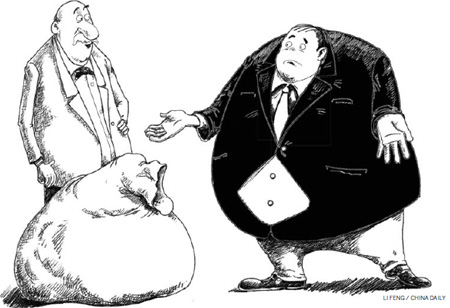Op-Ed Contributors
The rich and the spirit of charity
By Grayson Clarke (China Daily)
Updated: 2010-08-20 06:10
 |
Large Medium Small |

Open the newspapers these days and you can hardly avoid reading about the activities of China's super rich - whether it is about the exclusive properties they are buying in London or the activities of their often-spoilt offspring.
One thing you certainly don't read too much about is their giving to good causes. If you do hear about that, it is usually international celebrities such as Jackie Chan or Yao Ming, who are leading the way. Contrast this with the situation in the United States where billionaire financier Warren Buffett has just finished a one-month campaign with 40 American billionaires pledging half of their personal wealth to charity.
I think, and of course, we shouldn't jump to conclusions. The appeals for help following the Wenchuan and Yushu earthquakes were very well supported and I am sure there were plenty of contributions from rich individuals. I also don't think we should make too much of a contrast with the US.
Pledges are pledges after all and even if they do happen, these people (never mind the ones who didn't subscribe) will still be very rich. They have also benefited more than any other group from the financial and tax reform of the past three decades, which have increased the gap between rich and poor across the developed world.
Still the charitable sector is extremely important in doing many of the important things the State simply can't afford to or in some cases cannot do very well. To have a thriving sector means that the basis of donations needs to be wide.
And that means those who can well afford to pay setting an example for the millions of ordinary people whose few yuan will be every bit as important as the millions contributed by rich individuals. So why aren't the Chinese super rich setting more such examples for their fellow citizens?
I don't think inheritance tax or death duties (or the lack of them in China) are a reason. In the world of numerous tax havens and no exchange controls the super rich in all societies are well able to structure their affairs to avoid these taxes. Rather I think the attitude comes down to a combination of reasons.
One of the important issues in the design of Chinese social security, which we in the EU-China Social Security Reform Cooperation Project take into account, is building on the culture of individual savings and the importance of being able to leave those savings to family heirs.